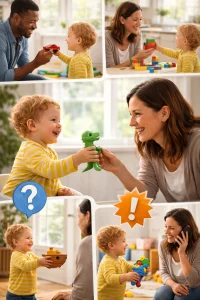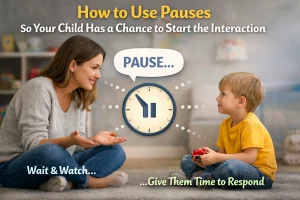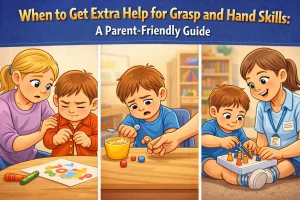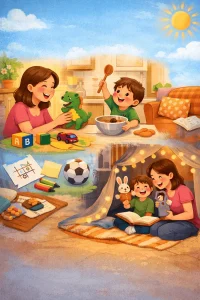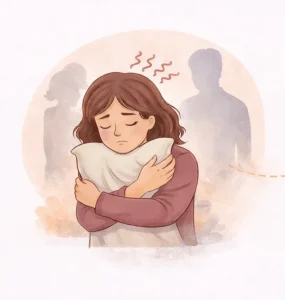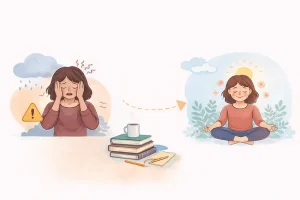Worried Your Baby Isn’t Talking Yet? Here’s What to Do
By Wellness Hub
Last Updated: June 16, 2025
If your baby isn’t saying any words yet, it’s completely natural to feel worried — especially when you see other children around the same age babbling, calling out “mama,” or asking for things. You might be wondering: Is this a speech delay in toddlers? Should I be doing something? Am I overthinking this?
First, take a deep breath. You’re not alone — many parents feel this way. Speech and language development can vary from child to child, and it’s okay to have questions. What matters most is being aware, staying curious, and taking simple steps when you feel something might be off.
If you’re noticing delays or just want reassurance, don’t wait. Start early with expert-guided support through our online speech therapy for kids and help your child thrive
Understanding Early Language Development
Before babies start saying their first words, they go through many important steps that build the foundation for talking. Understanding how babies learn to talk can help you notice the little things they’re already doing — and where they might need a little support.
Receptive vs. Expressive Language
You’ve probably heard the terms “receptive” and “expressive” language before. Here’s what they mean:
| Term | What It Means | Example |
|---|---|---|
| Receptive Language | What your baby understands | Looking at you when you say their name |
| Expressive Language | What your baby can express using sounds, gestures, or words | Pointing to a toy, waving bye-bye, or babbling “ba-ba” |
Many babies understand much more than they can say. So even if your baby isn’t saying words yet, they may still be soaking up everything you’re saying.
How Babies Learn to Communicate
Babies are like little scientists — they learn by watching, listening, and copying the people around them. Some key ways they pick up language include:
- Listening to your voice as you talk through the day
- Watching your face and mouth when you speak
- Noticing how you respond to their gestures and sounds
- Hearing words repeated in daily routines like mealtime or bath time
Even silly games like peekaboo or nursery rhymes help build early communication skills.
Why Joint Attention Matters
One of the most important building blocks of speech is something called joint attention — that moment when both you and your child are focused on the same thing. For example, when you point to a dog and your baby looks at it too, that’s joint attention. These shared moments help your baby connect words to the world around them.
Typical Speech Milestones by Age
If you’re wondering “When do babies usually start talking?” — you’re not alone. Understanding typical speech milestones by age can help you figure out what’s expected and whether your baby might need extra support.
Every child develops at their own pace, but here’s a general guide to what most babies do from 6 to 24 months:
6–9 Months: Early Sounds and Listening Skills
- Babbles using a mix of sounds like “ba-ba” or “da-da”
- Turns toward familiar voices and sounds
- Reacts to music or singing
- Shows excitement when spoken to
At this stage, babies are building their sound library. They’re learning the rhythm of language and how communication works.
9–12 Months: First Gestures and Basic Sounds
- Uses gestures like pointing, waving, or reaching
- Imitates simple sounds you make
- Begins to understand basic words like “no” or “bye”
- Might say early sounds like “mama” or “dada” (but not always with meaning yet)
These are exciting months where babies begin to connect sounds with people and actions.
12–18 Months: First Words and Simple Directions
- Says 1–10 words, often unclear but consistent
- Follows simple commands like “Come here” or “Give me the ball”
- Tries to copy words you say
- Uses a mix of words and gestures to communicate wants
Even a few consistent words at this stage — like “milk,” “up,” or a sibling’s name — show strong progress.
18–24 Months: Vocabulary Explosion Begins
- Uses 20 to 50+ words
- Begins combining 2 words like “more juice” or “mama go”
- Names familiar people and objects
- Tries to label what they see around them
By age 2, many toddlers start using short phrases and love to repeat what they hear. That’s why this stage is often called a “word explosion” period.
Remember: If your baby isn’t meeting many of these speech milestones, that doesn’t mean something is wrong — but it may be worth checking in. The earlier you notice and act, the more support you can give.
Common Myths About Late Talking
Sometimes what delays parents from seeking help isn’t a lack of love or attention — it’s the well-meaning advice from friends, family, or even social media. While every child is different, certain late talking myths can create confusion and lead to unnecessary waiting.
Let’s clear up a few of the most common ones — gently, with facts.
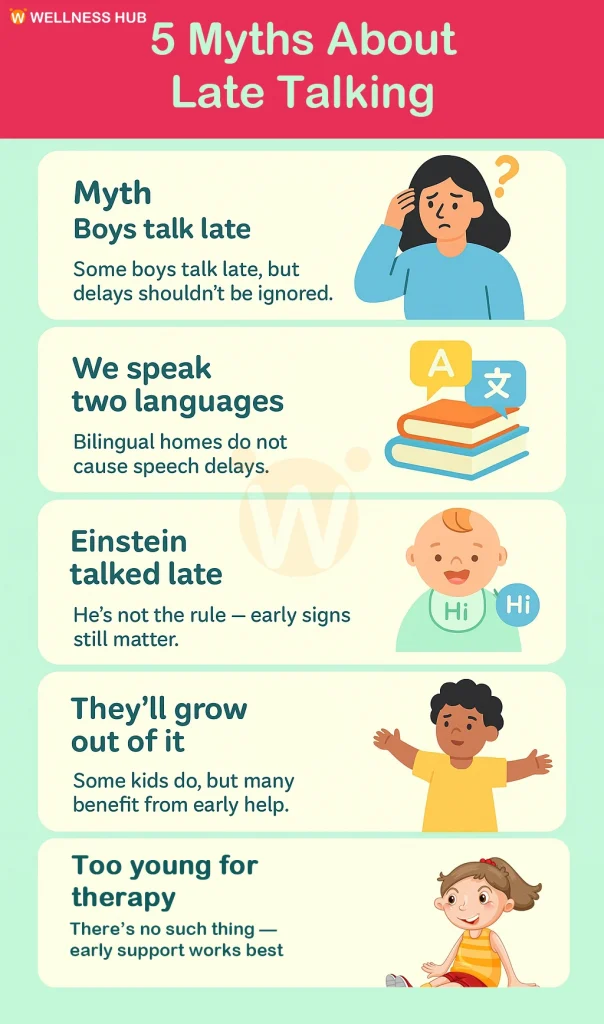
“Boys Talk Late — It’s Normal”
Yes, boys might start talking a little later than girls on average, but the difference is small — and not a reason to ignore delays. If your son isn’t using any words by 16–18 months, or isn’t pointing or showing interest in communicating, it’s a good idea to take a closer look.
Fact: Speech and language milestones apply to all children. Delays in either gender should be taken seriously.
“We’re a Bilingual Family — That’s Why”
Raising a child in a bilingual or multilingual home is a gift. It doesn’t cause speech delays. In fact, babies exposed to more than one language often hit the same milestones, just with a wider vocabulary base.
Fact: Bilingual children may mix languages early on, but they still reach key milestones like babbling, first words, and gestures at the same age as monolingual kids.
If you’re concerned, a speech-language therapist at Wellness Hub can guide you through bilingual development and what’s typical in your child’s situation.
“Einstein Talked Late — So It’s Fine”
It’s a popular story that Albert Einstein didn’t talk until age four — but even if that were true, he’s the exception, not the rule. Delayed speech can be linked to underlying concerns that benefit from early support.
Fact: Most late talkers catch up with support. Waiting too long can mean missed opportunities during your child’s most critical years for brain and language development.
What You Can Take Away
It’s okay to ask questions. It’s okay to listen to your gut. And it’s more than okay to seek help early. There’s no downside to getting a professional opinion — but waiting on myths can delay the support your child might need.
Causes of Speech Delay
If your baby isn’t talking yet, you might be wondering why. It’s a common and very valid question — and one that deserves real, compassionate answers.
There isn’t just one reason children experience speech delays. In fact, speech and language development is influenced by many different factors. Let’s walk through some of the possible causes of speech delay, keeping in mind that every child is unique — and this isn’t about labeling, but understanding.
1. Hearing Issues
Hearing plays a huge role in how children learn to speak. If a child can’t hear clearly — due to chronic ear infections, fluid in the ears, or other hearing difficulties — it can affect how they pick up sounds, words, and tone.
What to watch for: Your child doesn’t respond to their name, seems to “tune out,” or startles less often at loud noises.
A simple hearing check is one of the first things a speech therapist or pediatrician may suggest when a child isn’t speaking as expected.
2. Autism Spectrum Disorders (ASD)
Some children with speech delays may be on the autism spectrum. In these cases, the delay is often paired with differences in social interaction, eye contact, or play.
What to watch for: Limited use of gestures, lack of pointing or showing, little response to name, or minimal interest in back-and-forth interaction.
It’s important to note: not all children with speech delays have autism, and not all autistic children have speech delays — but early signs can sometimes overlap.
Learn more about early signs of autism in toddlers.
3. Developmental Language Disorder (DLD)
Some children have a condition called Developmental Language Disorder, where language skills don’t develop in the usual way — even though the child may have normal hearing and intelligence.
What to watch for: Struggles with both understanding and using language, slow vocabulary growth, or difficulty forming sentences over time.
This condition can be lifelong, but early speech therapy makes a significant difference.
4. Oral-Motor Challenge
In some cases, children want to speak — but have trouble coordinating the muscles needed for speech (lips, tongue, jaw). This might be due to conditions like childhood apraxia of speech or muscle tone issues.
What to watch for: Difficulty making clear sounds, trouble feeding or chewing, limited babbling, or frustration when trying to speak.
5. Environmental or Social Factors
Babies learn by watching, listening, and interacting. If a child has fewer opportunities for interaction — due to limited conversation, excessive screen time, or lack of stimulation — it can affect speech development.
What to watch for: Minimal verbal engagement at home, little exposure to books or talking routines, or passive screen time replacing real conversations.
Even in a busy household, small daily changes can create more opportunities for language learning.
Remember: This isn’t about blame — and it’s not about jumping to conclusions. It’s about understanding the range of factors that may affect your child’s ability to communicate — so you can take thoughtful, informed next steps.
Don’t Wait — When Early Support Matters
It can be tough to know when to act. Many parents wonder, “Should I wait a little longer? Maybe my child is just on their own timeline?” While that’s sometimes true, there are moments when waiting too long can delay the help your child really needs.
Early intervention for speech delay isn’t about rushing into therapy — it’s about understanding your child’s development and offering gentle, age-appropriate support as soon as it’s needed.
Key Signs It’s Time to Act
If your toddler isn’t meeting some of these communication milestones, it might be time to check in with a professional:
- No babbling by 9 months
- No words by 16 months
- Doesn’t point, wave, or use gestures
- Doesn’t respond to name or simple instructions
- Rarely makes eye contact or shows interest in people
- You feel something just isn’t right — trust that instinct
Even if you’re not seeing every sign, a speech-language evaluation can give you clarity, not commitment.
Why Early Intervention Works So Well
The earlier we support a child’s speech and communication, the better the outcomes. Why? Because the toddler brain is wired for learning during these early years. That’s when it’s easiest to shape new pathways for communication, social skills, and emotional growth.
- Stronger brain development
- Faster improvement in language skills
- Better connection with parents and peers
- Easier time learning in preschool and beyond
You don’t have to wait for a “real problem” to show up. If something feels off, you can take action now — gently, proactively, and with guidance.
Building Language Skills at Home
When you’re worried about your toddler’s speech, it’s easy to feel helpless — but the truth is, you play one of the most important roles in helping them communicate. The good news? You don’t need fancy tools or special training. Just a few simple, consistent changes in your daily routine can make a big difference.
Here are some gentle, everyday activities you can start using today to help your child’s language grow.
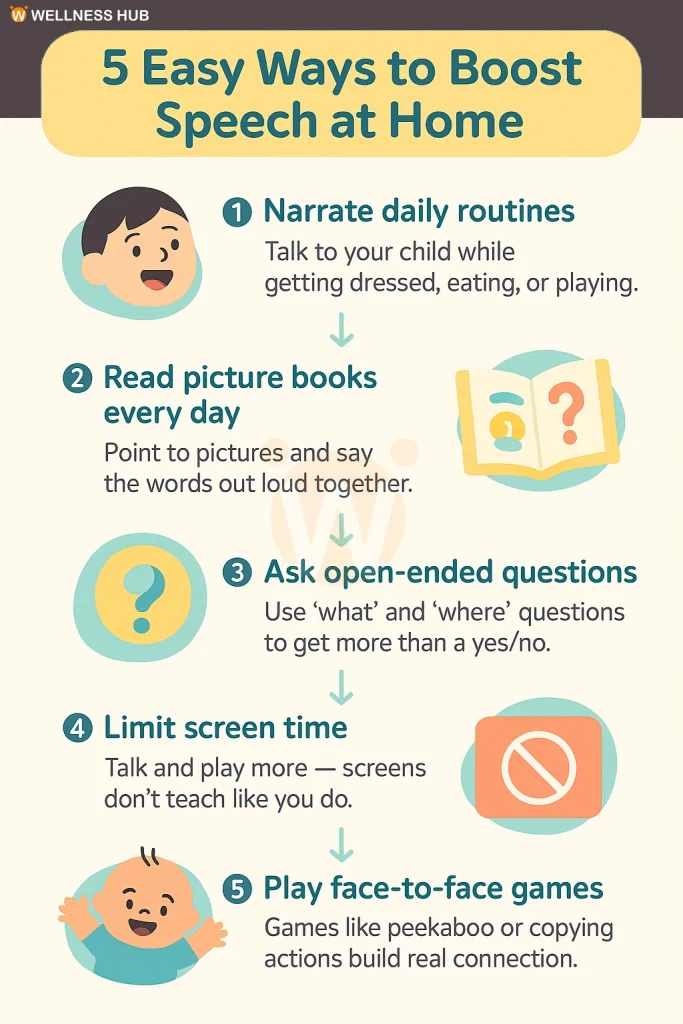
Narrate Your Day
Talk to your toddler throughout the day — even if they’re not talking back yet. Think of it as “sports commentary” for your life.
- “Now I’m cutting the apple. Ooh, juicy apple!”
- “Let’s put on your shoes. First foot, now second foot!”
- “You’re jumping! Jump, jump, jump!”
This kind of running narration helps your child hear how language fits into the world around them.
Create a Reading Routine
Reading picture books daily — even for just 5–10 minutes — builds vocabulary, attention, and comprehension.
- Choose books with simple, repetitive words
- Point to pictures and name them aloud
- Let your child turn the pages and “help” with sounds or words
Interactive reading is one of the most powerful tools in your speech toolbox.
Use Open-Ended Questions
Instead of yes/no questions like “Do you want water?”, try asking:
- “What do you want to drink?”
- “Where should we go now?”
- “Who is in this picture?”
These types of questions encourage your toddler to express more — even if it’s just gestures, sounds, or single words at first.
Limit Screen Time
While cartoons and apps seem educational, they don’t replace real human interaction. The American Academy of Pediatrics recommends very limited screen time for children under 2 — and always with an adult nearby to talk about what’s happening.
Instead of screens, prioritize:
- Singing together
- Looking at family photos
- Playing pretend games with dolls, cars, or animals
Play Face-to-Face Games
Simple games like peekaboo, rolling a ball, or copying funny faces build joint attention — the foundation of communication.
- Sit at your child’s eye level
- Take turns (even if they can’t speak yet)
- Celebrate their sounds and gestures
These moments are powerful — they show your child that communication is fun, safe, and rewarding.
Tools & Resources to Support You
You’re already doing the most important thing — showing up, asking questions, and looking for ways to help your child. To make your journey easier, we’ve created free, therapist-approved tools that provide clarity, confidence, and simple next steps — all from home.
Speech Development Milestone Chart
Not sure what to expect at each age? Our visual chart outlines speech and language milestones from 6 months to 3 years, so you can:
- Know what’s typical
- Spot early signs of delay
- Track your child’s progress easily
Download the milestone chart
Home Activity Checklist
This checklist includes 15+ therapist-recommended activities that blend naturally into your daily routine — no prep needed.
- Talking ideas for meals, bath, and play
- Games to build attention and imitation
- Vocabulary-building through everyday moments
Support Your Child’s Growth with the BASICS App
Our award-winning BASICS App is a therapist-designed, parent-friendly tool that supports your child’s communication, attention, and learning — through fun, screen-free activities.
- Daily exercises built by speech-language experts
- Simple routines to boost speech and social skills
- Designed especially for young children with delays
Empower your child’s speech and learning journey with scientifically-backed tools designed for autism and ADHD. Download on Google Play; Download on the App Store
Conclusion
If you’re worried your toddler isn’t talking yet, you’re not alone — and you’re not doing anything wrong. Noticing it early means you care, and that’s the first step toward helping your child grow. Every child is different, and some need a little extra support to get started. Early help can make a big difference. At Wellness Hub, we offer expert online speech therapy and parent-friendly guidance. No pressure — just real help, at your pace.
Frequently Asked Questions:
1. Is it normal if my 1-year-old doesn’t say any words?
Yes, some kids start talking a little later, but by 12–15 months, most babies say at least one or two simple words like “mama” or “bye.” If your child isn’t saying any words by 16 months, it’s a good idea to check with a speech therapist.
2. What are the early signs of speech delay in toddlers?
Some signs include no babbling by 9 months, not using gestures like pointing, no words by 16 months, not responding to their name, or not following simple directions. These may be signs your child needs extra support.
3. Can speech delay mean autism?
Speech delay can be a sign of autism, but not always. Some kids have speech delay without autism. If your child also shows signs like no eye contact or little interest in people, talk to a professional to understand better.
4. Does being bilingual cause speech delay?
No, growing up in a bilingual home does not cause speech delay. Children can learn two languages at once. If a child is delayed in both languages, it may be a sign to seek help.
5. When should I take my child to a speech therapist?
If your child isn’t meeting common speech milestones (like saying a few words by 18 months), it’s best to get an evaluation. Early help can improve your child’s communication quickly and gently.
6. What can I do at home to help my child talk?
Talk to your child during daily routines, read picture books, play simple games, limit screen time, and use gestures. These small steps can boost language skills at home.
7. How do I talk to my pediatrician about speech delay?
Be clear and share what you’ve noticed. Mention if your child isn’t talking, using gestures, or responding. Ask if your child should get a hearing test or see a speech-language therapist.
8. How does online speech therapy work for toddlers?
Online therapy is done over video with a licensed therapist. Parents sit with the child during the session. It includes fun, guided activities to improve speech and language.
9. What is the BASICS App?
The BASICS App is a free, simple tool by Wellness Hub to check your child’s speech and communication milestones. It helps you know if your child may need extra support.
10. Can a speech delay go away on its own?
Some kids catch up on their own, but it’s hard to know who will and who won’t. Early support helps avoid long-term issues and makes talking easier and more fun for your child.
About the Author:
Rajini Darugupally
M.Sc., Speech-Language Pathologist (9+ years of experience)
Rajini is a passionate and dedicated Speech-Language Pathologist with over 9+ years of experience, specializing in both developmental speech and language disorders in children and rehabilitation in adults. Driven by a desire to empower each individual to find their voice, Rajini brings a wealth of experience and a warm, genuine approach to therapy. Currently, at Wellness Hub, she thrives in a team environment that values innovation, compassion, and achieving results for their clients.
Book your Free Consultation Today
Parent/Caregiver Info:
Client’s Details:
* Error Message
